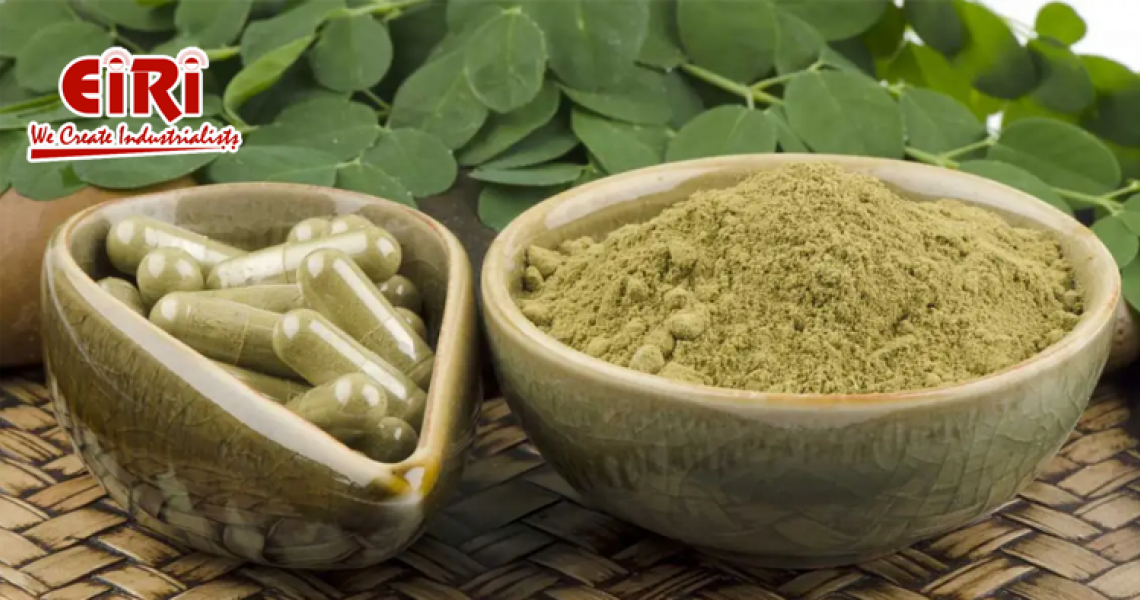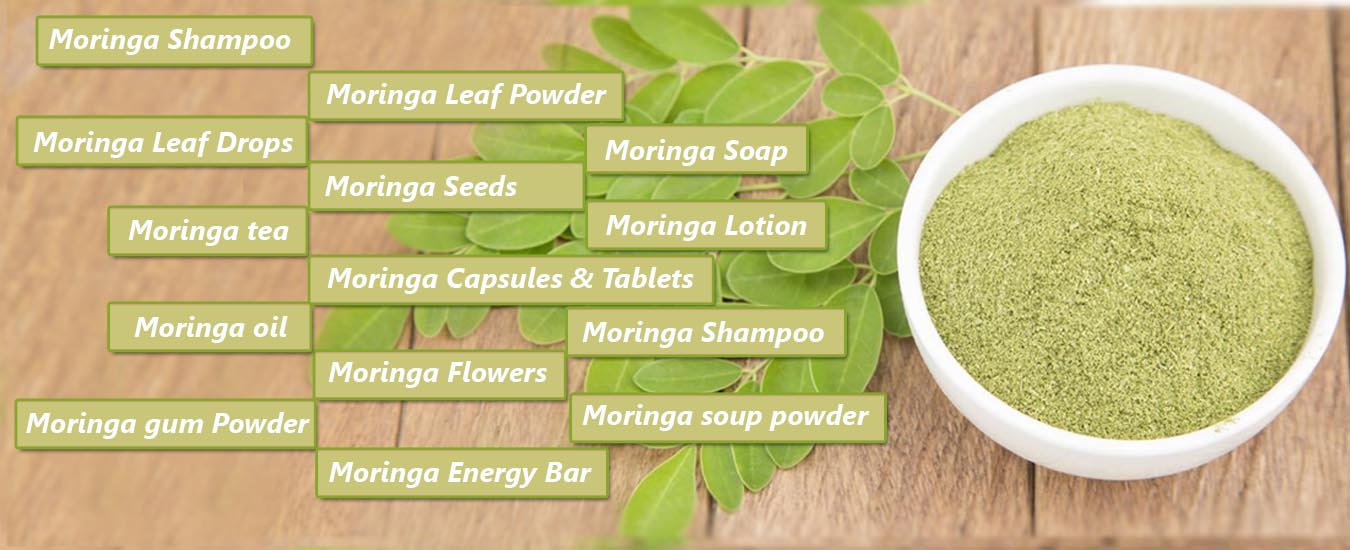Moringa Products: Unveiling the Health Benefits and Lucrative Market Potential

Moringa, also known as the "miracle tree," has gained significant popularity in recent years due to its numerous health benefits and versatility. The various parts of the moringa tree, including its leaves, leaf powder, seeds, and oil, are widely used to produce a range of products with exceptional nutritional value. This article explores the market overview of moringa products, their current market demand, future growth prospects, as well as the challenges and opportunities in this flourishing industry.
Market Overview of Moringa Products
The global market for moringa products has witnessed substantial growth, driven by increasing consumer awareness about the health benefits of moringa and the rising demand for natural and organic products. Moringa tea, with its rich antioxidant properties and immune-boosting effects, has gained traction among health-conscious individuals. Moringa leaves and leaf powder, known for their high nutrient content, are used in various culinary preparations and dietary supplements. Moringa oil, valued for its moisturizing and anti-aging properties, is extensively used in the cosmetic and skincare industry. Additionally, moringa seeds have gained popularity as a superfood ingredient in the food and beverage sector.
The market for Moringa products has been steadily growing due to the increasing awareness of its health benefits and nutritional value. Moringa is a versatile plant that offers various parts that can be utilized for different purposes. Here are some of the current market trends and popular uses of Moringa:
Moringa Tea: Moringa leaves are commonly used to make tea, which is known for its antioxidant properties and potential health benefits. Moringa tea is gaining popularity as a natural and nutritious beverage.
Moringa Leaves and Leaf Powder: Moringa leaves are highly nutritious and rich in vitamins, minerals, and antioxidants. They are used in various culinary preparations, such as salads, soups, and smoothies. Moringa leaf powder is also used as a nutritional supplement and as an ingredient in health and wellness products.
Moringa Oil: Moringa seeds contain oil that is extracted and used for various purposes. Moringa oil is known for its moisturizing and nourishing properties, making it a popular ingredient in skincare and haircare products.
Moringa Seeds: Moringa seeds have gained attention for their potential health benefits and their use in traditional medicine. They are often used as a nutritional supplement, in herbal remedies, and in the production of edible oil.
Moringa as a Dietary Supplement: Moringa is recognized as a superfood due to its high nutritional content. It is available in the form of capsules, tablets, and powdered supplements, which are consumed for their health-promoting properties.

The current market for Moringa products is driven by the increasing demand for natural and organic products, as well as the growing interest in plant-based nutrition and wellness. The versatility of Moringa and its wide range of applications make it an attractive choice for both consumers and manufacturers in the health and wellness industry.
Current Market Demand:
The demand for moringa products has experienced a steady rise in recent years, with consumers increasingly seeking natural and nutrient-dense alternatives. The growing interest in health and wellness, coupled with the increasing preference for organic and plant-based products, has significantly contributed to the demand for moringa. Moringa's reputation as a powerhouse of essential vitamins, minerals, and antioxidants has made it a sought-after ingredient in the health and wellness sector.
The global market for Moringa products has been experiencing significant growth in recent years, driven by the increasing demand for natural and organic health products. According to market research, the global Moringa products market was valued at around $5.6 billion in 2020 and is expected to reach $8.5 billion by 2026, with a compound annual growth rate (CAGR) of 7.5%.
In India, Moringa holds a significant market share due to the country's rich cultivation of Moringa trees and the popularity of its products in traditional medicine and Ayurveda. The Indian Moringa market is estimated to witness steady growth in the coming years, driven by the rising demand for natural health supplements and the increasing awareness of the nutritional and medicinal properties of Moringa.
Overall, the global and Indian Moringa markets offer promising opportunities for entrepreneurs and manufacturers in the health and wellness industry. With the growing consumer interest in natural and sustainable products, the demand for Moringa is expected to continue to rise, creating ample prospects for businesses operating in this sector.
Moringa Processing and Value-Added Products
As for processing Moringa, the leaves are typically harvested, washed, and dried. They can be ground into a fine powder and used as a dietary supplement or added to various food and beverage products. Moringa oil is obtained by cold-pressing the seeds, and it is commonly used in skincare and cosmetic products. The seeds can also be consumed directly or used to extract oil. Additionally, Moringa leaves, pods, and seeds can undergo further processing to create various value-added products, such as tea blends, herbal extracts, and herbal formulations.
The processing of Moringa involves careful handling of the raw materials to preserve the nutritional content and maintain product quality. Different processing methods are employed based on the specific product requirements. It is crucial to follow quality control measures and adhere to regulatory standards to ensure the safety and efficacy of Moringa products.
Harvesting and Handling Moringa:
The Moringa tree is known for its fast growth and abundant foliage. When it comes to harvesting Moringa leaves, timing is crucial to ensure optimal nutrient content. Once harvested, the leaves are carefully washed to remove impurities and debris. Proper handling and storage techniques are employed to preserve the quality and freshness of the leaves.
Drying and Powdering Moringa Leaves:
Drying is a critical step in Moringa leaf processing. The leaves are laid out to dry naturally or using specialized equipment to remove moisture. Once dried, the leaves are finely powdered, resulting in Moringa leaf powder, a highly nutritious ingredient used in dietary supplements, herbal blends, and culinary preparations.
Cold-Pressing Moringa Seeds for Oil Extraction:
Moringa seeds are rich in oil, which is extracted through a cold-pressing method to retain its nutritional properties. The extracted Moringa oil is light and non-greasy, making it an ideal ingredient for skincare products, hair care treatments, and culinary applications. Cold-pressing ensures that the oil retains its natural antioxidants and beneficial compounds.
Value-Added Products from Moringa:
Beyond Moringa leaf powder and oil, there is a range of value-added products that can be derived from Moringa. These include Moringa tea blends, herbal extracts, capsules, and Moringa-infused skincare formulations. The versatility of Moringa allows for creative product development and innovation, catering to various consumer preferences and market demands.
Quality Control and Compliance:
Maintaining quality standards and ensuring product safety are essential in Moringa processing. Adhering to Good Manufacturing Practices (GMP) and quality control measures is crucial to deliver consistent and reliable products. Compliance with regulatory requirements, including food safety standards and labeling regulations, is of utmost importance to gain consumer trust and meet market expectations.
Moringa processing unlocks the immense potential of this remarkable plant, offering a wide array of products with diverse applications in the health and wellness industry. From Moringa leaf powder to oil and value-added formulations, the possibilities are vast. Entrepreneurs and manufacturers in the Moringa industry have the opportunity to tap into the growing demand for natural and sustainable products, while ensuring quality, compliance, and consumer satisfaction.
Remember, successful Moringa processing requires expertise, attention to detail, and a commitment to maintaining the inherent nutritional properties of this exceptional plant. By harnessing the power of Moringa through effective processing techniques, we can create products that contribute to a healthier and more sustainable future.
Future Growth Prospects:
The future outlook for the moringa product industry is highly promising. The expanding health-conscious consumer base, coupled with the rising preference for sustainable and eco-friendly products, is expected to fuel the demand for moringa products. The growing popularity of natural remedies and alternative medicine further enhances the market potential. Additionally, the versatility of moringa products offers opportunities for innovation and product diversification, catering to evolving consumer preferences.
Here are some key points regarding the future prospects of moringa processing:
Growing Market Demand:
The global market for moringa products is projected to witness significant growth in the coming years. Increasing awareness of the nutritional benefits and health-promoting properties of moringa has fueled the demand for its products across the food, dietary supplement, and personal care industries.
Expanding Application Areas:
Moringa products have diverse applications, ranging from food and beverages to cosmetics and pharmaceuticals. As research and development efforts continue, new uses and applications for moringa are being discovered, opening up new market opportunities. For example, moringa oil is gaining traction in the beauty and personal care industry due to its nourishing and rejuvenating properties.
Sustainable and Organic Trends:
The rise in consumer preference for sustainable and organic products has created a favorable environment for moringa processing. Moringa is a natural and renewable resource that can be cultivated organically, aligning with the growing demand for eco-friendly and ethically sourced ingredients. This trend is expected to drive the demand for moringa products in the future.
Health and Wellness Industry:
With the increasing focus on health and wellness, there is a rising demand for functional foods and dietary supplements. Moringa, with its rich nutrient profile and potential health benefits, is well-positioned to cater to this market segment. As consumers become more health-conscious and seek natural alternatives, the demand for moringa-based products is likely to grow.
Research and Innovation:
Ongoing research on moringa's bioactive compounds and potential applications is expected to fuel innovation in product development. The identification of new bioactive compounds and the development of novel extraction and processing techniques can lead to the creation of value-added moringa products with enhanced functionality and efficacy.
Global Market Expansion:
While the demand for moringa products is steadily growing worldwide, there are still untapped markets that offer significant growth potential. Developing regions, including Asia, Africa, and Latin America, where moringa is native, present opportunities for local processing and product development, catering to regional preferences and needs.
However, it's important to consider the challenges associated with moringa processing, such as maintaining consistent quality, addressing supply chain issues, and ensuring sustainable sourcing practices. Overcoming these challenges through proper planning, collaboration, and adherence to industry standards will be crucial for the long-term success of the moringa processing industry.
Overall, the future of moringa processing and products appears promising, driven by the increasing demand for natural, sustainable, and health-enhancing solutions. Entrepreneurs and businesses in this sector have the opportunity to capitalize on the growing market trends and consumer preferences by developing innovative moringa-based products that cater to the evolving needs of global consumers.
Challenges and Opportunities:
While the moringa product industry holds immense growth potential, it also faces certain challenges. One such challenge is the need for consistent and high-quality raw materials to meet the increasing demand. Sustainable sourcing practices and adherence to quality standards are vital to maintain consumer trust. Additionally, market competition from other superfood products and the need for effective marketing strategies pose challenges for businesses in this industry.
However, with the right approach, there are numerous opportunities to thrive in the moringa product market. Developing value-added products, such as moringa-infused beverages, snacks, and skincare formulations, can tap into new market segments. Establishing strategic partnerships with local farmers and investing in research and development can ensure a sustainable supply chain and product innovation. Furthermore, expanding into international markets and capitalizing on the growing global demand for natural and functional food products can lead to significant growth opportunities.
Conclusion:
The moringa product industry offers a promising landscape for entrepreneurs and businesses. With its exceptional health benefits and growing consumer interest, moringa products have the potential to capture a significant share of the global health and wellness market. By addressing challenges, leveraging opportunities, and staying attuned to evolving consumer preferences, businesses can capitalize on the increasing demand for moringa products and contribute to a healthier and more sustainable future.










